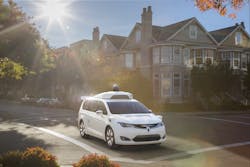Do you distrust driverless vehicles? You are not alone.
There is still widespread distrust of autonomous vehicles (AVs) in this country, at least according to a new report issued by research firm Morning Consult this week.
However, that may be poised to change as Americans watch as a variety of driverless vehicle pilot tests are deployed across the nation – tests of AVs in both freight-hauling and people-carrying operations.
Morning Consult surveyed over 2,000 adults in the U.S. to get a feel of their views and expectations about carmakers, energy sources, electric and self-driving cars.
In terms of driverless technology, most held negative feelings towards it, but with some interesting caveats:
- While Americans distrust self-driving cars, that could change in the future: 52% of Americans say they somewhat or completely distrust self-driving cars based on what they know, compared to 32% who say they somewhat or completely trust them (16% don't know, no opinion). Yet 58% of Americans said while they don't trust self-driving cars as it stands now, their opinion could change as the technology evolves, compared to 36% who said they will never trust self-driving cars.
- Americans split on whether self-driving vehicles should be on the road: When asked whether they support or oppose the use of self-driving cars on American roads, 42% of Americans said they somewhat or strongly oppose them on the road, compared to 39% who said they somewhat or strongly support them (19% don't know/no opinion).
- Americans are skeptical that humans can removed from the driving equation: When asked which of the following statements come closest to your view, 45% of Americans said self-driving vehicles will never be able to replace human drivers, compared to 17% who said they will be fully able to replace drivers by 2050, and 14% who said they will replace drivers by 2030.
This isn’t an academic discussion, either, as we all know that testing of driverless vehicles is expanding rather rapidly in the U.S.
On the freight side, California-based udelv just started testing its autonomous last-mile delivery vehicle on public roads in San Mateo, CA. The small all-electric delivery vehicle traveled a 2.5-mile from Draeger's Market to two nearby customers, navigating traffic lights, lane changes, and left turns. Though supervised by a test driver at all times, In compliance with existing California regulations, the vehicle operated itself.
In its current configuration the all-electric udelv features 18 secure cargo compartments with automatic doors that tap into a cloud-based system shared between the vehicle, customers and merchants so they can be “unlocked” only at the proper customer destination.
In its current configuration, udelv said its vehicle can drive for up to 60 miles per cycle and can carry up to 700 pounds of cargo.
"Deliveries are the perfect first application for autonomous vehicles," said Daniel Laury, CEO of udelv. "Customers simply open the locker with a press of a button on their mobile device and the vehicle heads on its way to the next delivery or back to the store."
He added that, based on McKinsey & Co. research, some 80% of all package deliveries are expected to be autonomous within the next decade. Laury also noted that udelv plans to test “dozens” of its vehicles on the roads in a few states “within a short timeframe.”
On the passenger-carrying side of the AV ledger, Fiat Chrysler Automobile (FCA LLC) is planning to provide several thousand of its Chrysler Pacifica Hybrid minivans to Waymo as part of Waymo’s effort to launch a driverless ride-hailing service.
FCA previously delivered 100 Pacifica Hybrid minivans, adapted for self-driving, to Waymo during the second half of 2016 and an additional 500 in 2017.
Now Waymo said it is set to open its autonomous ride-hailing service to the public beginning in Phoenix this year and it has officially tested its self-driving technology in 25 cities across the U.S., including Atlanta, San Francisco, Metro Detroit, Phoenix and Kirkland, Washington.
"With the world's first fleet of fully self-driving vehicles on the road, we've moved from research and development to operations and deployment," noted John Krafcik, Waymo’s CEO. “These additional [Pacifica] vehicles will help us scale."
Last November, Waymo began test-driving a fleet of those FCA minivans on public roads without a driver at the wheel, attaining Level 4 autonomy – a classification determined by the Society of Automotive Engineers.
Of course, all of this is occurring alongside driverless truck testing, too; testing that’s been going on for a while now.
In short, whether we like the idea of driverless vehicles or not, they are rapidly becoming reality here in the U.S. That means a big adjustment period lies ahead for those of us who aren’t all that thrilled with the idea of vehicles driving themselves.
About the Author
Sean Kilcarr
Editor in Chief
Sean Kilcarr is a former longtime FleetOwner senior editor who wrote for the publication from 2000 to 2018. He served as editor-in-chief from 2017 to 2018.
